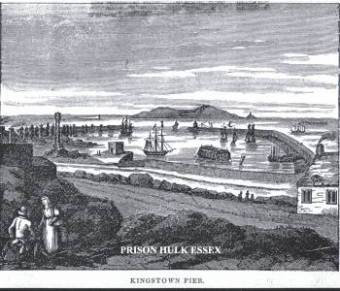A Romantic Tale
Ireland 1828
Perhaps the prisoner mentioned below was held on the Essex hulk in Kingstown Harbour before being transported to Australia on the Convict Ship Morley.
The Morley, under Captain Henry Williams and Surgeon Peter Cunningham departed Dublin in November 1827..........
'In the bay of Kingstown there is moored a gloomy, cold, and ill looking convict hulk, a receptacle for all the bad subjects who are treated, at the expense of the Treasury, to a voyage across the seas. Yesterday morning two carriages were seen driving rapidly towards the beach off which this ugly ship lies. When the vehicles approached, it was observed that the foremost one was an open private carriage, and from its elegant appointment, apparently belonging to a person of opulence and rank.
 The travellers in this carriage were an elderly gentleman and a lady, who, from her age and other circumstances, seemed to be his wife. Their mien at once bespoke them as belonging to the Patrician order. They appeared to lavish the most assiduous attention upon a young and lovely girl, who, holding an infant to her breast, sat beside them, her head reclining on the bosom of the lady, and one of her hands held fondly by the old man. The entire party betrayed their affliction at some event, the nature of which we can only guess. Although the carriage drove rapidly by, it was distinctly seen that tears rolled quickly down the cheeks of the interesting girl, while the efforts of her companion were directed, as well as could be judged, to alleviate the grief which was evidently overpowering her.
The travellers in this carriage were an elderly gentleman and a lady, who, from her age and other circumstances, seemed to be his wife. Their mien at once bespoke them as belonging to the Patrician order. They appeared to lavish the most assiduous attention upon a young and lovely girl, who, holding an infant to her breast, sat beside them, her head reclining on the bosom of the lady, and one of her hands held fondly by the old man. The entire party betrayed their affliction at some event, the nature of which we can only guess. Although the carriage drove rapidly by, it was distinctly seen that tears rolled quickly down the cheeks of the interesting girl, while the efforts of her companion were directed, as well as could be judged, to alleviate the grief which was evidently overpowering her.In the second carriage, which was surrounded by a guard of military, there sat two persons - one a young and handsome man attired in the convict dress, and the other apparently a prison officer. The convict appeared to be of the finest order of peasants, and exhibited in his manner a mind disturbed, but at the same time a wild resoluteness of purpose. His eyes were strained towards the foremost carriage, and his looks appeared to rest entirely upon the young female who sat fronting him within it.
As the carriage approached the beach, a boat put off from the convict ship and reached the shore as they arrived. The travellers in the carriages instantly embarked, and were rowed towards the ship. The military and the second carriage soon drove off. Many inquiries were made by the curious observers of this scene as to the condition of the parties 'Who they were?' 'Whence did they come?' 'Where are they going?' To all questions of this kind there was made a sullen reply, expressive of the ignorance of the individual interrogated upon the subject. After the lapse of some time the boat neared the shore, and the old gentleman and lady already described were landed. They were much oppressed with grief, and frequently looked back to the ship, as if they endeavoured to catch a glimpse of their young companion, who, with the infant, remained on board. They entered the carriage, it drove off.
The observers of this scene, amongst whom were some elderly maiden ladies, remarkably clever at explaining riddles and such other puzzling exercises, drew near and congregated into parties, in which the affair was discussed. Those of your readers who have a heart for romance, will easily imagine one of the innumerable modes of arrangement by which this affair may be explained satisfactorily and according to the rules in such cases made and provided.
For my own part I shall only say that the decision of a tea party held in the immediate vicinity of the convict ship and formally promulgated on the following day, declares that the young female is....of the South of Ireland; that she yielded to the impulses of her heart, and, unknown to her family, married a young tenant on her father's estate; that time, the tell tale of such affairs divulged her secret; that the peasant had become involved in one of those illegal confederacies which some months since were known to exist in that quarter of the country; that the law has visited upon him its penalties; and that since his conviction the infant has been born; that the participation of the peasant in the disturbances alluded to was so extensive, as to completely destroy the possibility of the government granting him his pardon, without manifest injustice to many other guilty individuals, who, seduced by his example, have been equally unfortunate in the result of their habits. Your readers will at once conjecture and correctly too, that the authority upon which I have ventured to give you this explanation, has declared the 'old gentleman and lady' to be the parents of the young and interesting wife of the convict peasant. I have embodied for you all the village speculations on the affair, and I shall leave you to form your judgement upon them.'
- The Standard, Wednesday August 8 1827 Dublin Ireland, 5th August 1827
↑